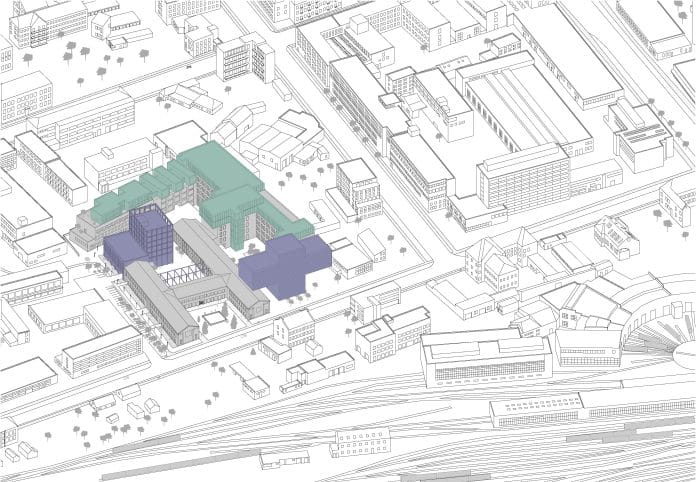Between 2017-2022, Lithuania has grown its digital economy by 16.8x annually, with the ecosystem now valued at over €9.5 billion. At the same time, Lithuania showcased resilience in tech funding in 2022, which was a turbulent year for the global technology sector, recording its second-best year ever in terms of VC funding. A host of global investors, including General Catalyst, Accel, Eurazeo, Antler and Speedinvest made their first investments into the Baltic state’s ecosystem in 2022.
The total volume of startups based in Vilnius has now reached 740. In addition, 67,100 expats moved to Vilnius last year, with this number expected to rise annually, with many working across the country’s digital sector. In total, Vilnius now has around 17,000 workers in its tech and digital ecosystem – a figure which is expected to double in the next 3 years.
It’s no surprise that Vilnius is uniquely positioned in Europe, as its real-estate infrastructure for the digital ecosystem is built from the ground up. Commercial real estate is built around what tech startups, scale-ups and multinationals need to thrive. As opposed to fitting the digital ecosystem into existing real estate, as we often see in other European hubs, which discourages community and collaboration within that ecosystem.
Having that in mind, Tech Zity announced a new €100 million infrastructure-first project which will create Europe’s largest campus for the digital ecosystem, in Vilnius, Lithuania. Upon completion in late 2024, Tech Zity will house 5,000 digital ecosystem workers in one sprawling campus, in Vilnius’ New Town – the former industrial site which sits across three adjacent streets.
In addition to the 5,000 desks available in private spaces, Tech Zity will have extensive co-working and co-living spaces, a number of world-class events locations on-site, meeting room space, as well as 10 restaurants, cafes and bars. To cater for this, the site will be open 24/7 – with a focus on becoming a night-time hub, cultural and educational venue, as well as a bespoke workplace campus.
Valdas Benkunskas, Mayor of Vilnius, comments: “Vilnius is maintaining a firm position within the European tech scene thanks to rapid innovations and visionary businesses such as Tech Zity. Bursting with innovative entrepreneurs, multinational talents, and ambitious investors, the capital has grown into a modern tech hub that evokes bold ideas, successful collaborations, and people-focused solutions. Tech Zity’s newest tech campus is a testament to the capital’s forward-thinking values.”
Tech Zity has adopted an ‘infrastructure-first’ approach, which centres around having every amenity any tech company might need on-site. This ranges from free-to-use cafe and co-working space for micro-companies, to commercial co-working space for pre-seed / seed-stage firms, to private office space – ranging from 10-1,000 desk locations.
At the heart of Tech Zity’s offering are co-living spaces, which provide tech workers with close-to-site homes, both close to work and the city centre’s extensive amenities and cultural hotspots. Tech Zity’s co-living spaces will centre around community outside of work for the inhabitants – providing access to bars, sports facilities and more, all on-site.
Darius Žakaitis, Founder of Tech Zity, comments: “I started investing in the Vilnius tech ecosystem in 2009 – when you could recall the name of every tech worker in the city on first name terms, and you could fit the entire tech ecosystem in one room. Now the city is home to some of Europe’s best-known tech firms – and we’re growing at a pace that requires significant investment in real estate infrastructure. Tech Zity is a first-of-its-kind project – in both ambition, being 30% larger than any tech campus developed previously in Europe, and in infrastructure terms – being the first to bring in every aspect of real estate that any technology business, from a pre-seed startup, through to the likes of Google, can call their home in Vilnius.”
Paying homage to its industrial heritage, Tech Zity aims to maintain the original design ethos of the sewing factories it is renovating – maintaining high-lofted, expansive factory-like office floors – with ceiling heights of at least 7 metres across the site. Tech Zity intends to replicate the great renovation and restoration projects of the 21st and late 20th century – including the Tate Modern and Battersea Power Station projects, both located in London.
Tech Zity has long been a focal point in the development of Vilnius’ digital ecosystem, first opening bespoke office space for the tech sector in 2013. The firm currently manages 3 tech campuses across the city and region – including Tech Park, Tech Loft and Tech Spa, which house companies including Google, BoredPanda, and Kilo Health.
The project is part-funded by Tech Zity’s existing operations, with support from Mantas Mikuckas, the COO and founder of Vinted. Tech Zity remains in talks with a number of investment banks, family offices and institutional investors for additional funding.




